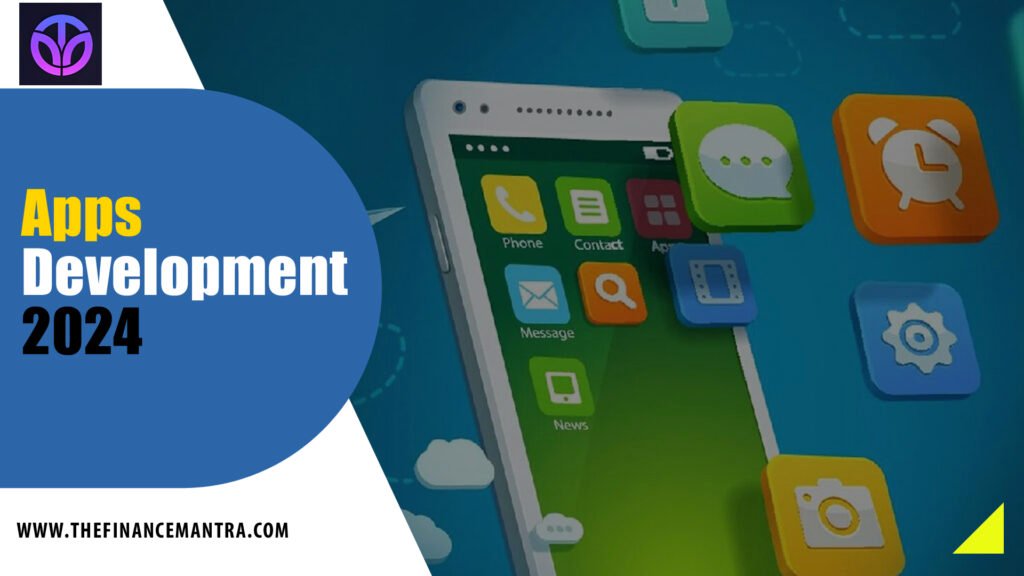App development remains a highly profitable industry, and 2024 promises even more opportunities for developers to capitalize on this growing market. With the increasing use of smartphones and tablets, businesses and individuals are looking for innovative applications that make their lives easier, more productive, and more fun. This comprehensive guide will explore the lucrative world of app development in 2024. We dive into the various aspects of App development earnings and discover how you can maximize your earnings.
The Booming App Market
- Growth Trends in App Development
- Keywords: “mobile app market growth,” “app development trends 2024,” “future of app development”
- The app market is expanding rapidly, driven by advancements in technology and increasing consumer demand. In 2024, the global app economy is expected to reach new heights, offering significant opportunities for developers.
2. Popular App Categories
- Keywords: “top app categories 2024,” “most profitable apps,” “best app niches”
- Some of the most profitable app categories include gaming, health and fitness, finance, education, and e-commerce. By focusing on these high-demand niches, developers can create apps that attract a large user base and generate substantial revenue.
3. Emerging Technologies in App Development
- Keywords: “AI in app development,” “blockchain apps,” “augmented reality apps”
- Technologies like artificial intelligence (AI), blockchain, and augmented reality (AR) are transforming the app development landscape. Incorporating these technologies into your apps can set you apart from the competition and offer users unique experiences.

Monetization Strategies for Apps
- In-App Purchases
- Keywords: “in-app purchase revenue,” “how to monetize apps,” “in-app purchase strategies”
- In-app purchases allow users to buy additional features, content, or virtual goods within the app. This model is particularly popular in gaming apps but can be applied to various other categories as well.
2.Subscription Models
- Keywords: “subscription app revenue,” “best subscription apps,” “recurring revenue from apps”
- Subscription models provide a steady stream of recurring revenue. Users pay a monthly or yearly fee to access premium content or features. This model works well for apps offering ongoing value, such as fitness apps, news apps, and productivity tools.
3.Advertising
- Keywords: “app advertising revenue,” “best ad networks for apps,” “how to make money with ads in apps”
- Advertising is a common monetization strategy where developers earn money by displaying ads within their apps. Partnering with ad networks like Google AdMob, Facebook Audience Network, or Unity Ads can help you maximize your ad revenue.
4.Freemium Model
- Keywords: “freemium app strategy,” “free vs paid apps,” “freemium app revenue”
- The freemium model offers a free version of the app with limited features, enticing users to upgrade to a premium version for additional functionality. This strategy can attract a large user base while generating revenue from premium users.
Developing Successful Apps
- Understanding Your Target Audience
- Keywords: “app user research,” “target audience for apps,” “user personas for app development”
- Knowing your target audience is crucial for developing apps that meet their needs and preferences. Conduct thorough market research, create user personas, and gather feedback to ensure your app resonates with its intended users.
2.Designing a User-Friendly Interface
- Keywords: “UI/UX design for apps,” “best app interface design,” “user-friendly app design”
- A well-designed user interface (UI) and user experience (UX) are essential for retaining users and encouraging them to engage with your app. Focus on simplicity, intuitive navigation, and appealing visuals.
3.Optimizing App Performance
- Keywords: “app performance optimization,” “how to speed up apps,” “reduce app load time”
- Performance is a critical factor in user satisfaction. Optimize your app for speed, minimize crashes, and ensure it runs smoothly across different devices and operating systems.
4.Implementing Security Measures
- Keywords: “app security best practices,” “protect user data in apps,” “secure app development”
- Security is paramount, especially for apps handling sensitive user data. Implement robust security measures to protect against data breaches, unauthorized access, and other threats.
Marketing Your App
- App Store Optimization (ASO)
- Keywords: “ASO tips,” “how to rank apps in app stores,” “best ASO strategies”
- App Store Optimization involves optimizing your app’s title, description, keywords, and visuals to improve its visibility in app stores. Effective ASO can increase your app’s discoverability and drive more downloads.
2.Social Media Marketing
- Keywords: “promote apps on social media,” “social media strategies for apps,” “best platforms to market apps”
- Leverage social media platforms like Facebook, Instagram, Twitter, and LinkedIn to promote your app. Create engaging content, run targeted ads, and interact with your audience to build a strong online presence.
3.Influencer Partnerships
- Keywords: “influencer marketing for apps,” “partner with influencers,” “influencer app promotion”
- Collaborate with influencers in your app’s niche to reach a wider audience. Influencers can create authentic content, reviews, and promotions that resonate with their followers and drive app downloads.
4.Content Marketing
- Keywords: “content marketing for apps,” “create engaging app content,” “blogging for app promotion”
- Create valuable content related to your app’s niche, such as blog posts, videos, infographics, and tutorials. Share this content on your website and social media channels to attract and engage potential users.
Case Studies: Successful App Developers
- Case Study: Game Development
- Keywords: “successful mobile games,” “game development success stories,” “top-grossing mobile games”
- Look at successful game developers like Supercell (Clash of Clans) and Niantic (Pokémon GO) for inspiration. These companies have mastered the art of creating addictive, engaging games that generate substantial revenue through in-app purchases and ads.
2.Case Study: Fitness Apps
- Keywords: “successful fitness apps,” “fitness app revenue,” “top fitness app developers”
- Apps like MyFitnessPal and Strava have achieved significant success by offering valuable features and a seamless user experience. They monetize through subscriptions, in-app purchases, and partnerships with brands.
3.Case Study: Finance Apps
- Keywords: “successful finance apps,” “finance app development,” “top finance app earnings”
- Finance apps like Mint and Robinhood have revolutionized how users manage their finances. By providing useful tools and insights, they have built loyal user bases and generated revenue through subscriptions, ads, and premium features.
Challenges in App Development
- Intense Competition
- Keywords: “app market competition,” “stand out in app stores,” “overcome app market challenges”
- The app market is highly competitive, with millions of apps available in app stores. To succeed, focus on creating unique, high-quality apps that offer real value to users.
2.Keeping Up with Technology
- Keywords: “stay updated with app tech,” “latest app development tools,” “new technologies in app development”
- Technology is constantly evolving, and staying updated with the latest trends and tools is crucial. Continuous learning and adaptation are necessary to maintain a competitive edge.
3.User Retention
- Keywords: “improve app user retention,” “reduce app churn rate,” “engage app users”
- Acquiring users is just the beginning; retaining them is the real challenge. Implement strategies to keep users engaged, such as regular updates, personalized content, and loyalty programs.
Future of App Development
- AI and Machine Learning Integration
- Keywords: “AI in mobile apps,” “machine learning app development,” “future of AI apps”
- AI and machine learning are set to play a significant role in the future of app development. These technologies can enhance user experiences by providing personalized recommendations, automating tasks, and improving app performance.
2. 5G Technology
- Keywords: “5G impact on apps,” “5G app development,” “future of mobile connectivity”
- The rollout of 5G technology will revolutionize mobile connectivity, offering faster speeds and lower latency. This will enable developers to create more sophisticated and data-intensive apps, opening up new possibilities for innovation.
3. Internet of Things (IoT) Integration
- Keywords: “IoT app development,” “smart home apps,” “IoT and mobile apps”
- The integration of IoT with mobile apps will continue to grow, allowing users to control and monitor smart devices through their smartphones. This presents new opportunities for developers to create apps that enhance connectivity and convenience.
Conclusion
The app development industry in 2024 is full of potential. By focusing on high-demand niches, implementing effective monetization strategies, and leveraging emerging technologies, developers can create profitable and innovative applications. Understanding your target audience, optimizing your app’s performance, and using solid marketing strategies are key to standing out in a competitive market.
As you embark on your app development journey, remember to stay adaptable and continually improve your skills. The future of app development offers endless possibilities, and with the right approach, you can gain significant benefits and make a lasting impact on the mobile technology landscape.
By following the insights and strategies outlined in this guide, you’re well on your way to unlocking the full potential of app development profits in 2024. Good luck!
(FAQs) About App Development Profits 2024
1. Is app development still profitable in 2024?
Answer: Yes, app development remains highly profitable in 2024. With the continuous growth in smartphone usage and the demand for innovative apps, there are ample opportunities for developers to generate significant revenue through various monetization strategies.
2. What are the most profitable app categories in 2024?
Answer: Some of the most profitable app categories in 2024 include gaming, health and fitness, finance, education, and e-commerce. These categories have a high demand and offer numerous opportunities for monetization through in-app purchases, subscriptions, and ads.
3. How can I monetize my app effectively?
Answer: Effective monetization strategies include:
- In-App Purchases: Offering additional features, content, or virtual goods for purchase within the app.
- Subscription Models: Charging users a recurring fee to access premium content or features.
- Advertising: Displaying ads within the app and earning revenue through clicks and impressions.
- Freemium Model: Offering a free version with limited features and a premium version with full functionality.
4. What technologies should I incorporate into my app to stand out in 2024?
Answer: Incorporating emerging technologies can help your app stand out. Consider integrating:
- Artificial Intelligence (AI): For personalized recommendations and automation.
- Blockchain: For secure transactions and data management.
- Augmented Reality (AR): For interactive and immersive experiences.
- 5G Technology: For faster speeds and enhanced connectivity.
- Internet of Things (IoT): For controlling and monitoring smart devices.
5. How do I ensure my app ranks well in app stores?
Answer: To improve your app’s ranking in app stores, focus on App Store Optimization (ASO). This involves:
- Optimizing Your App’s Title and Description: Use relevant keywords.
- Creating Appealing Visuals: High-quality icons and screenshots.
- Encouraging Positive Reviews: Provide a great user experience to get good ratings and reviews.
- Regular Updates: Keep your app updated with new features and improvements.
6. What are some effective marketing strategies for promoting my app?
Answer: Effective marketing strategies include:
- Social Media Marketing: Promote your app on platforms like Facebook, Instagram, and Twitter.
- Influencer Partnerships: Collaborate with influencers in your niche to reach a wider audience.
- Content Marketing: Create valuable content related to your app’s niche and share it on blogs and social media.
- Paid Advertising: Run targeted ads on Google, social media, and other relevant platforms.
7. What are the challenges in app development, and how can I overcome them?
Answer: Common challenges include:
- Intense Competition: Focus on creating unique, high-quality apps that offer real value to users.
- Keeping Up with Technology: Stay updated with the latest trends and continuously improve your skills.
- User Retention: Implement strategies to keep users engaged, such as regular updates and personalized content.
- Security: Implement robust security measures to protect user data and ensure app integrity.
8. How much does it cost to develop an app?
Answer: The cost of developing an app can vary widely based on factors like complexity, features, and development team. On average, a simple app can cost between $10,000 to $50,000, while more complex apps with advanced features can cost upwards of $100,000.
9. How long does it take to develop an app?
Answer: The development timeline depends on the complexity of the app. A simple app might take 2-3 months to develop, while a more complex app with advanced features can take 6-12 months or longer.
10. Can I develop an app without coding skills?
Answer: Yes, there are various no-code and low-code platforms available that allow you to develop apps without extensive coding skills. Platforms like Appy Pie, Bubble, and Adalo offer tools to create functional apps with drag-and-drop interfaces.
11. What are the best platforms for app development in 2024?
Answer: Some of the best platforms for app development in 2024 include:
- Android Studio: For developing Android apps.
- Xcode: For developing iOS apps.
- React Native: For building cross-platform apps.
- Flutter: For creating high-performance, cross-platform apps.
- Unity: For developing mobile games.
12. How do I protect my app idea from being copied?
Answer: Protecting your app idea can be challenging, but some steps include:
- Non-Disclosure Agreements (NDAs): Use NDAs when discussing your idea with potential partners or developers.
- Patents: If your app has a unique and innovative feature, consider patenting it.
- Trademarks: Protect your app’s name and logo with trademarks.
- Copyrights: Register the code and content of your app.
13. What are the best tools for app performance optimization?
Answer: Some of the best tools for app performance optimization include:
- Firebase: For app performance monitoring and analytics.
- Crashlytics: For tracking and fixing app crashes.
- New Relic: For detailed performance analytics and monitoring.
- AppDynamics: For end-to-end performance monitoring and optimization.
14. How can I improve user engagement in my app?
Answer: To improve user engagement, consider:
- Personalization: Tailor content and features to individual user preferences.
- Push Notifications: Send timely and relevant notifications to keep users informed and engaged.
- Gamification: Incorporate game-like elements such as rewards and challenges.
- User Feedback: Regularly gather and act on user feedback to improve the app experience.
15. What are the future trends in app development?
Answer: Future trends in app development include:
- Increased Use of AI and Machine Learning: For smarter, more personalized apps.
- 5G Technology: Enabling more advanced and data-intensive applications.
- Augmented Reality (AR) and Virtual Reality (VR): For immersive user experiences.
- Wearable Technology Integration: Developing apps for smartwatches and other wearables.
- Sustainable and Green Apps: Focusing on environmental impact and sustainability.


